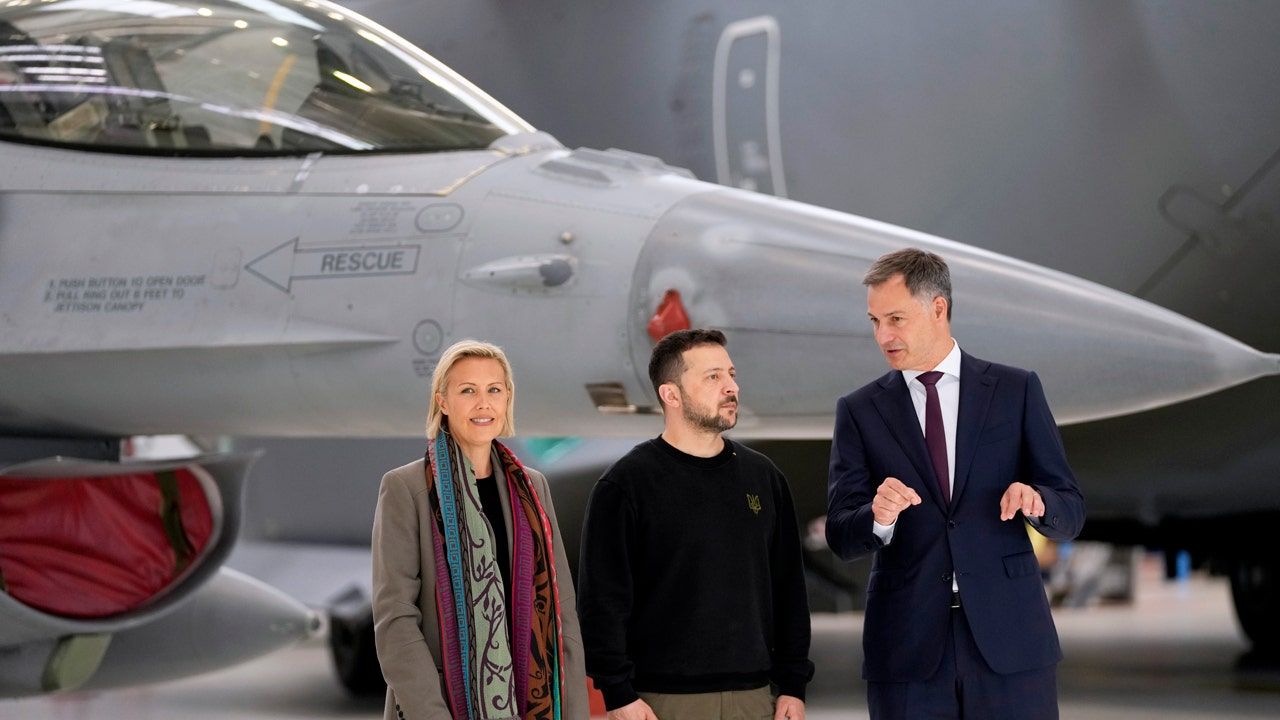- Ukraine could keep some of the F-16 fighter jets it hopes to receive from its Western allies at foreign bases to protect them from Russian attacks.
- Russian President Vladimir Putin has warned that Moscow could consider launching attacks on facilities in NATO countries if they host fighter jets used in Ukraine.
- In response to Russia's latest offensive, the United States and other NATO allies have allowed Ukraine to use weapons they supply to carry out limited attacks inside Russia.
Ukraine could keep some of the F-16 fighter jets it will receive from its Western allies at foreign bases to protect them from Russian attacks, a senior Ukrainian military official said on Monday.
Belgium, Denmark, the Netherlands and Norway have pledged to provide Ukraine with more than 60 American-made F-16 fighter jets to help it defend itself against Russian attacks. Ukrainian pilots are currently undergoing training to fly the fighter jets ahead of deliveries expected to begin later this year.
Serhii Holubtsov, head of aviation for the Ukrainian air force, said that “a certain number of aircraft will be stored in secure air bases outside Ukraine so that they will not be attacked here.”
ZELENSKYY THANKS FRENCH PROMISES OF FIGHTER PLANES TO HELP FIGHT RUSSIA
Holubtsov told U.S. government-funded Radio Free Europe/Radio Liberty that those F-16s could be used to replace damaged aircraft while they undergo repairs, as well as to train Ukrainian pilots abroad.
“In this way we will always be able to have a certain number of aircraft in the operational fleet that corresponds to the number of pilots we have,” he stated. “If there are more pilots, there will be more planes in Ukraine.”
Russian President Vladimir Putin has warned that Moscow could consider launching attacks on facilities in NATO countries if they host fighter jets used in Ukraine.
Belgian Prime Minister Alexander De Croo, right, and Belgian Defense Minister Ludivine Dedonder, left, with Ukrainian President Volodymyr Zelenskyy, center, in front of an F-16 at the airport Melsbroek military in Brussels, May 28, 2024. (AP Photo/Virginia Mayo, file)
“If they are stationed at air bases outside the Ukrainian borders and used in combat, we will have to see how and where to attack the assets used in combat against us,” Putin said last year. “It represents a serious danger of NATO becoming even more involved in the conflict.”
In March, the Russian leader again warned Ukraine's Western allies not to provide air bases from which F-16s could launch raids against Kremlin forces. Those bases would become a “legitimate target,” he said.
“The F-16s are capable of carrying nuclear weapons and we will also have to take this into account when organizing our combat operations,” Putin said.
The F-16s require a high level of runways and reinforced hangars to protect them from ground attacks. It's unclear how many Ukrainian air bases can meet those requirements, and Russia will surely quickly target some that can accommodate them once the planes arrive.
Holubtsov noted that the F-16s will help protect border and frontline regions from Russian glide bombs that have inflicted significant damage on both troops and residential areas, including Kharkiv. Glide bombs are Soviet-era heavy bombs equipped with precision guidance systems and dropped from aircraft flying out of range of air defenses.
“I think we will succeed, first of all, in pushing back the planes that drop gliding bombs further from the line of contact,” he said. “If we manage to push them back at least another 19-31 miles, this can already be considered a turning point and an achievement, if not of superiority, then of parity in the airspace.”
Ukraine's Western allies are seeking to bolster military support for kyiv as Russian troops have launched attacks along the more than 620-mile front line, taking advantage of a long delay in U.S. military aid. Ukraine is currently struggling to slow the Russian advance near its second largest city, Kharkiv, less than 20 miles from the border.
CLICK HERE TO GET THE FOX NEWS APP
The United States and other NATO allies have responded to the latest Russian offensive by allowing Ukraine to use the weapons it delivers to kyiv to carry out limited attacks inside Russia. The decision could potentially impede Moscow's ability to mass its troops for a major offensive near Kharkiv and other border areas.
Last week, Putin responded by warning that Moscow “reserves the right” to arm Western adversaries around the world. “If they supply (weapons) to the combat zone and demand the use of these weapons against our territory, why don't we have the right to do the same?” Putin said.
He did not specify where those weapons could be sent. The United States has said Russia has turned to North Korea and Iran to bolster its arsenal of relatively simple weapons, but Moscow could tap into its arsenal of high-tech missiles to share with Western adversaries if Putin decides to follow through on his threat.












